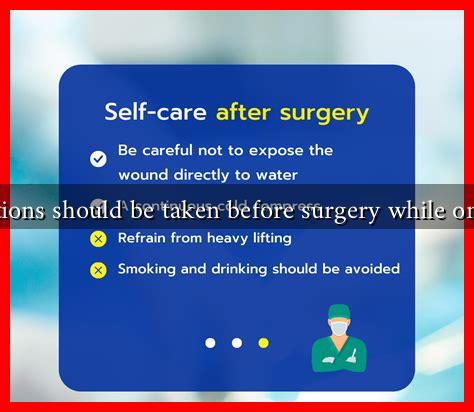-
Table of Contents
- What Precautions Should Be Taken Before Surgery While on Prednisone?
- Understanding Prednisone and Its Effects
- Key Precautions to Take Before Surgery
- 1. Inform Your Surgical Team
- 2. Assess Dosage and Timing
- 3. Monitor for Infections
- 4. Manage Blood Sugar Levels
- 5. Prepare for Potential Complications
- Case Studies and Statistics
- Conclusion
What Precautions Should Be Taken Before Surgery While on Prednisone?
Prednisone is a corticosteroid medication commonly prescribed to reduce inflammation and suppress the immune system in various medical conditions, including autoimmune diseases, allergies, and certain cancers. While it can be highly effective, patients on prednisone must take specific precautions before undergoing surgery. This article explores the necessary steps to ensure a safe surgical experience for individuals on this medication.
Understanding Prednisone and Its Effects
Prednisone works by mimicking the effects of cortisol, a hormone produced by the adrenal glands. It helps manage inflammation and immune responses but can also lead to several side effects, particularly when used long-term. Some of these side effects include:
- Increased risk of infection
- Delayed wound healing
- Fluid retention and hypertension
- Gastrointestinal issues, such as ulcers
- Bone density loss
Given these potential complications, it is crucial for patients to communicate openly with their healthcare providers about their prednisone use before any surgical procedure.
Key Precautions to Take Before Surgery
Here are several essential precautions that patients on prednisone should consider before undergoing surgery:
1. Inform Your Surgical Team
Always disclose your prednisone use to your surgeon and anesthesiologist. This information is vital for tailoring your surgical plan and anesthesia management. Failure to do so can lead to complications during and after surgery.
2. Assess Dosage and Timing
Patients may need to adjust their prednisone dosage before surgery. In some cases, a temporary increase in dosage may be necessary to manage stress on the body during the surgical procedure. This adjustment should only be made under the guidance of a healthcare professional.
3. Monitor for Infections
Due to the immunosuppressive effects of prednisone, patients are at a higher risk for infections. It is essential to:
- Maintain good hygiene before surgery.
- Report any signs of infection, such as fever or unusual redness, to your doctor.
- Consider prophylactic antibiotics if recommended by your healthcare provider.
4. Manage Blood Sugar Levels
Prednisone can cause elevated blood sugar levels, which is particularly concerning for diabetic patients. Monitoring blood glucose levels before and after surgery is crucial. Adjustments to diabetes medications may be necessary, and patients should work closely with their endocrinologist.
5. Prepare for Potential Complications
Patients on prednisone should be aware of the potential for delayed wound healing and other complications. Discussing these risks with your surgical team can help in planning postoperative care effectively.
Case Studies and Statistics
Research indicates that patients on long-term corticosteroid therapy, such as prednisone, have a higher incidence of surgical complications. A study published in the Journal of Surgical Research found that patients on corticosteroids had a 30% higher risk of postoperative infections compared to those not on these medications. This statistic underscores the importance of taking the necessary precautions before surgery.
Conclusion
In summary, patients on prednisone must take specific precautions before undergoing surgery to minimize risks and ensure a successful outcome. Key steps include informing the surgical team about prednisone use, assessing dosage and timing, monitoring for infections, managing blood sugar levels, and preparing for potential complications. By taking these precautions, patients can significantly improve their surgical experience and recovery. Always consult with healthcare professionals to tailor these recommendations to your individual health needs.

